Football hooligans may be kicked off trains
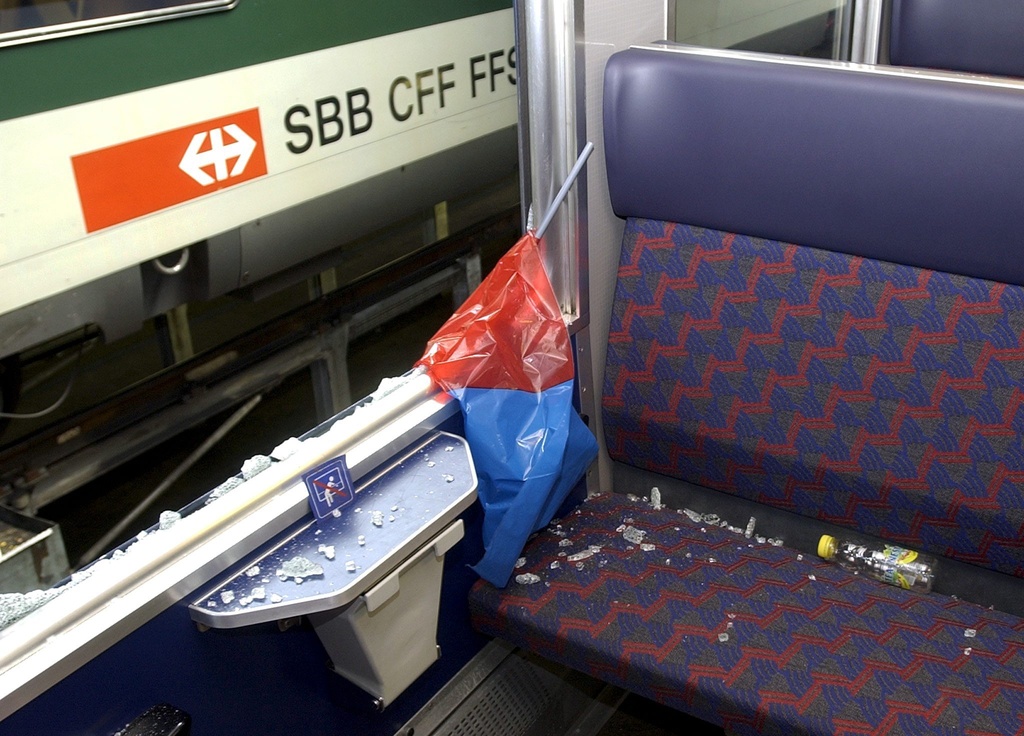
Swiss authorities are examining radical proposals to deal with train-wrecking hooligans, such as dumping them in the middle of nowhere in the event of trouble.
Every season rampaging fans cause about SFr3 million ($3.5 million) worth of damage to trains. The destruction caused after May’s Swiss Cup final alone went into five figures.
“Things can’t go on as they are,” Peter Füglistaler, head of the Federal Transport Office, told the Sunday newspapers NZZ am Sonntag and Le Matin Dimanche. “It’s time to act before a serious accident occurs.”
The Transport Office and Federal Railways are holding a high-level meeting before the end of the month to discuss possible measures, which include alcohol tests and a ban on alcohol and glass bottles, as well as the possibility of throwing troublesome travellers off the train between stations.
“The police can stop a small bus full of rampaging supporters from continuing on their way. So why should it be different for public transport?” asked the transport office chief.
Füglistaler also questioned the current legislation whereby anyone purchasing a train ticket in Switzerland had the right to take a train. He said they were checking what the railway authorities were legally allowed to do. If necessary, changes to the law would be proposed.
The authorities are reportedly keen to introduce a combined match-train ticket which would force the away fans to use special trains organised and paid for by their football club to make them more responsible for supporters’ safety and security.
At present fans are separated from the ordinary travelling public by buying reduced tickets for special trains, and any damage is paid for by the Federal Railways.
“Under the current system there are always away club stewards and police present on trains, but it’s not enough to prevent trouble,” Federal Railways spokesman Frédéric Revaz told swissinfo.ch.
Political interest
Swiss politicians are also closely monitoring developments.
Christoph von Rotz, a rightwing Swiss People’s Party parliamentarian from canton Obwalden, said, “Like a private coach firm, the public transport operators should be able to refuse people certain services.”
Social Democratic Party President Christian Levrat said he has twice travelled on trains full of football fans from German-speaking Switzerland.
“I would never have dared get on with children,” he commented. “And I quickly realised that it wasn’t worth discussing or trying to calm people down. I understand the Federal Railways’ position.”
“But I’m not certain the Federal Railways should be allowed to choose what they do and who they transport.”
Karin Keller-Sutter, president of the Conference of Cantonal Justice and Police Directors, told the 20 Minuten online news site she was frustrated with the pace of change.
“I’m disappointed as the authorities have invested a great deal but I’m not sure how motivated the Swiss Football League (SFL) is. Their engagement has to be greater, for example, on the question of combined match-train tickets,” she said.
Play it down
The SFL, meanwhile, plays down football-related problems on trains, while playing up its cooperation on the issue.
“The situation is by far not as bad as described by some politicians in the country. Nevertheless we are very aware that we need to find more efficient ways to deal with vandalism and violence,” SFL spokesman Roger Müller told swissinfo.ch.
“We are discussing different options and measures with the Federal Railways. As we have limited competences outside the stadiums ourselves, there is no moving forward without cooperation with all organisations involved.”
Yet damage to trains continues to mount up each year with seats slashed, carriages and toilets wrecked, and bottles and seats thrown onto the track – thus endangering traffic.
After the last Swiss Cup final between FC Sion and FC Xamax Neuchâtel on May 29 in Bern, a passenger waiting for a train in Lausanne was injured by a bottle thrown out of a special train, and the platforms in Neuchâtel and Biel even had to be cleared as a fan train went through.
Not real fans
Domenicangelo Massimo, director of FC Sion, remains opposed to measures like combined match-train tickets, however.
“When the Federal Railways propose a combined ticket for a U2 concert, they don’t ask U2 to pay,” he told Le Matin Dimanche.
Massimo also made light of recent problems, saying most FC Sion fans had travelled to the Swiss capital by coach.
“For the final 258 buses left from canton Valais and there were no problems.”
The problems do not lie with groups of fans but rather with the occasional supporters who let off steam during big games, explained Sion Ultras [fans] President Chris, who added that real fans were actually taking the issue seriously.
“We are currently thinking about creating an organisation to manage fan movements by train. In this way we can ensure a better management with people specially appointed who are well known to oversee each compartment.”
Switzerland has been affected by football hooliganism since the start of the 1980s.
There have been serious incidents at regular intervals. Experts say football hooliganism now affects almost all teams in the top division, while less spectacular local incidents add up. The problem has fragmented and clashes are difficult to predict and manage.
In June 2006 the Swiss Football League unveiled tougher measures against hooligans. Clubs are now more responsible for their fans when they play away games, meaning they have to organise the ticket sales for their sections of the away stadium themselves.
The guest club also has to take the personal details of their fans as well as provide somebody from the club to accompany the supporters and record violent incidents. An anti-violence campaign and mobile cameras, financed by the league, were also introduced.
These initiatives came on top of a raft of anti-hooligan measures approved by parliament in 2006 to crack down on violent fans ahead of the 2008 European Football Championship. They included a national hooligan database, travel restrictions for known troublemakers, stadium bans, obligation to attend police stations on match days and 24-hour preventive custody.
These modifications, which were urgently introduced into federal internal security law, became part of cantonal legislation from January 2010.
In June 2010 more anti-hooliganism moves were announced. An accord signed between cantonal governments or cities, the police and the football authorities specifies who is responsible for security in and around stadiums, stipulates the measures that have to be taken and in particular apportions the costs.
The plan includes restrictions on the sale of alcoholic beverages, the installation of surveillance cameras, the deployment of police observers and extending a hooligan database.
Clubs will have to draw up a concept to stop the use of fireworks and flares among spectators and prevent acts of violence and racism.

In compliance with the JTI standards
More: SWI swissinfo.ch certified by the Journalism Trust Initiative

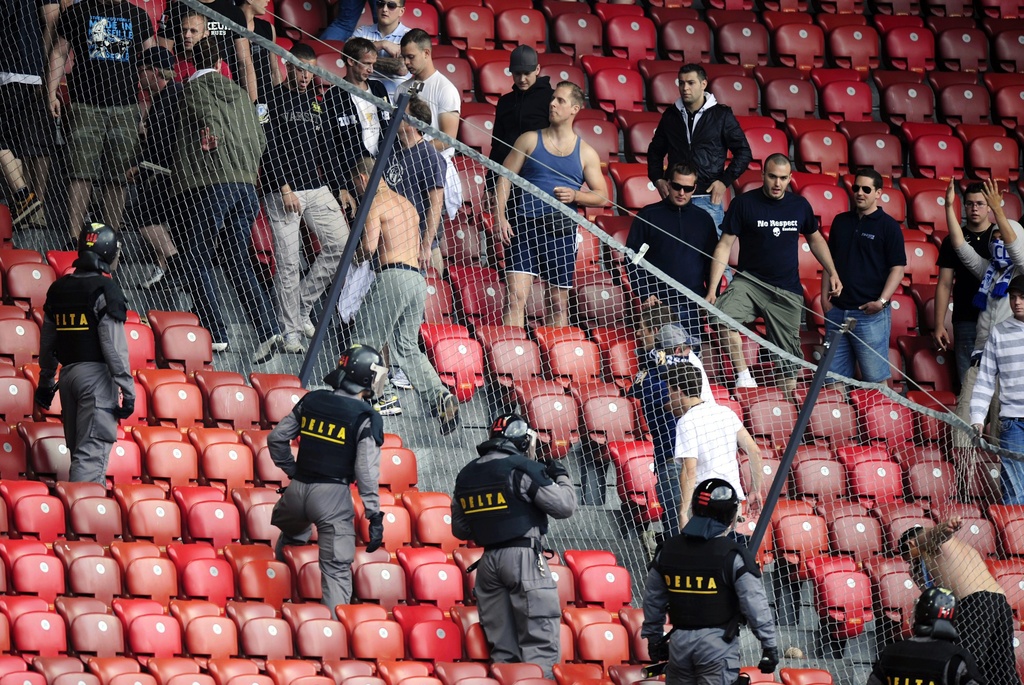
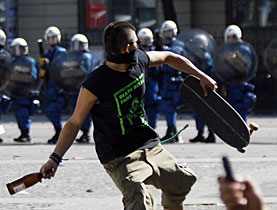
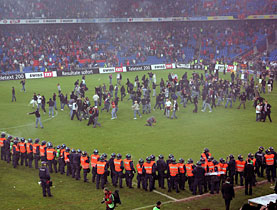
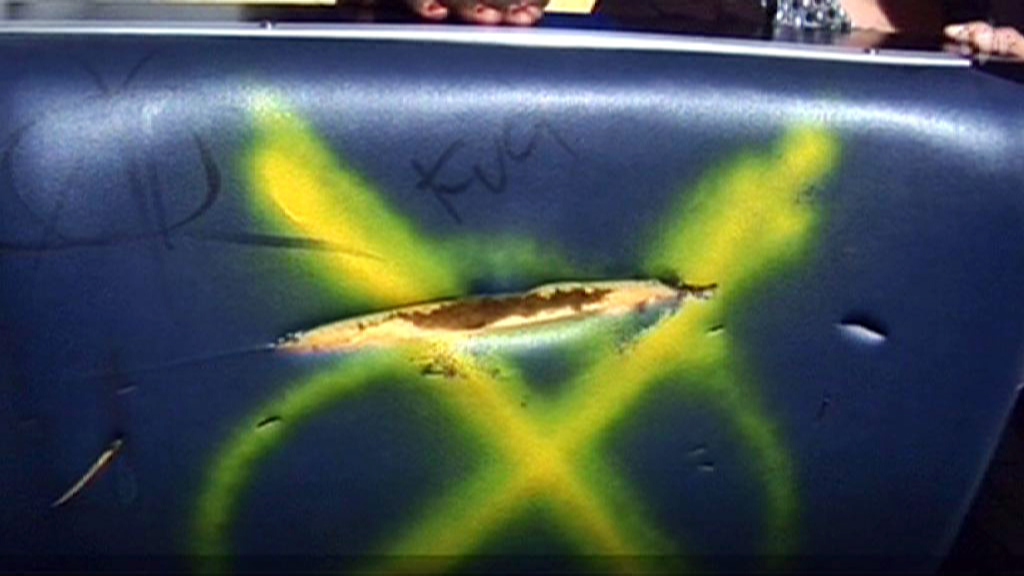
You can find an overview of ongoing debates with our journalists here. Please join us!
If you want to start a conversation about a topic raised in this article or want to report factual errors, email us at english@swissinfo.ch.